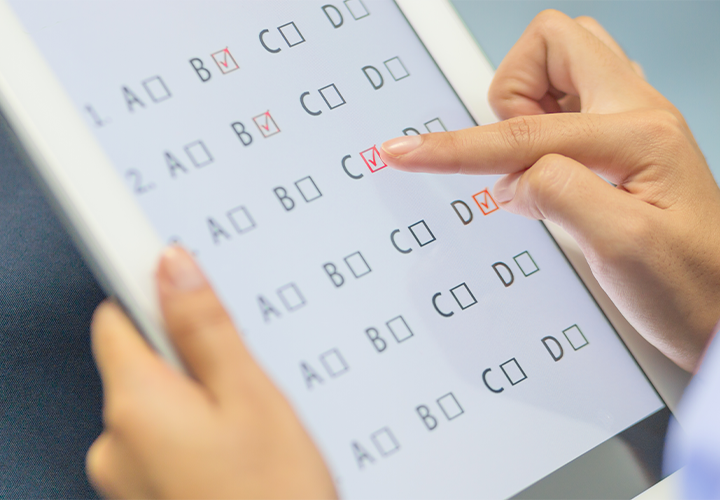Blog
What Are the Best Types of Questions for Online Course Testing?

You’ve set your learning objectives. You’ve written your modules. And you’ve picked out a course design platform that works for your business. But you want to make sure that your staff — whether they’re new recruits learning the basics, or veterans building new skills — are getting the most out of your meticulously designed online learning course.
Testing is only one method to help learners get the most out of their online courses, but it does come with several benefits. It can help learners retrieve and recall the course material, and allows them to discover gaps in their knowledge. This can be particularly important in industries where training is tied to health and safety (whether it’s an industrial setting or a restaurant). In online learning — where the classic short, long, and essay questions aren’t practical — it’s essential that course designers pick the right kinds of questions. So, what are the best types of questions for online course testing?
The best types of questions for online courses may seem pretty familiar — they might even take you back to grade school pop quizzes, but don’t let the test-stress cloud your judgment! Choosing the right question for the right learning objective can ensure learners retain information and think critically about the material.
True/false
One of the best types of questions for digital learning is also the simplest: the humble true/false question. The user just needs to determine whether a statement is either true or false — two options, no-frills. But this type of question can be written and answered quite quickly.
True/false questions are particularly useful when learners need to be tested on a large amount of material, according to academic affairs resources from the University of Tennessee at Chattanooga. That said, learners have a 50-50 chance of simply guessing the right answer. As such, online learning courses should have a large number of these questions to adequately test their knowledge.
Multiple-choice
Tried, tested, and true, multiple-choice questions are a fairly diverse set. One of the best formats for online course testing, multiple-choice questions help students apply what they’ve learned throughout the course and foster better analytic skills.
They take more thought to answer compared to true/false questions and can’t be guessed as easily, meaning learners will need to think more critically about each option before choosing. The downside is that they can be a bit harder to write, as they require test-makers to come up with reasonable-sounding incorrect options among which to hide the right answer, according to the UTC.
Three is the optimal number of choices in a multiple-choice question — two feasible distractor answers, and one correct answer says a blog post on Ohio State University’s website. Any additional options usually don’t make the question any harder.
In any case, multiple-choice is the gold standard for a reason. If the goal is simply to include a question to ensure the person actually reviewed the material, even one well-constructed multiple-choice question can help you easily determine if the person reviewed the materials.
Matching
Matching questions can take several different forms. Learners will sometimes be provided with an incomplete statement, and be asked to fill in the blank, choosing from a series of clauses (only one of which is correct). Other times, they will be presented as two columns, where the concept in the left column will match an answer on the right.
According to the University of Waterloo, matching questions can help learners recall the course materials, and they are usually quite quick to create for test-makers. They take a little more time to answer, compared to true/false or even multiple-choice questions, however, they are also a strong option. They share much in common with multiple-choice questions but have more variations, such as sequencing and categorizing exercises. Further, because they are so versatile, they can prompt students to think about the learning material in different ways.
No questions at all
Not every single training course requires a test to measure comprehension, as the goal may be as simple as having the employees review or be introduced to the material. Instead, you might choose to have learners read a document or watch a video and click a button to confirm that they read the information. This might not gauge how much knowledge they’ve retained, but it will make things easier on you and your employees, and if a course objective is to inform or motivate staff, testing can be redundant.
All of the above?
No question type will fit all your needs in a test, and the best type of question for online course learning will vary depending on the ideas you want to impart, and the outcomes you want your learners to achieve. According to Algonquin College, true/false and multiple-choice questions are useful tools in helping learners to remember, whereas multiple choice and matching questions help them apply their knowledge.
So, take the time to consider which types of questions best fit your course’s needs.
Don’t forget, “all of the above” is an acceptable answer. Nothing is stopping you from mixing up your question format, especially if you’re asking several questions. It will help keep your test interesting, engaging, and allow you to test for knowledge in different ways.
There are a number of simple yet powerful course authoring platforms on the market right now, so choosing the questions may be your most difficult challenge.


